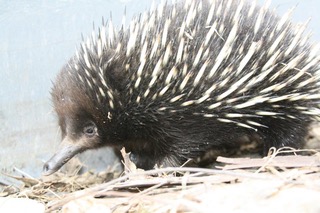 |
| Photo by Roz Holme |
First of all, you need to ask yourself the question if it's really necessary to move the Echidna. If there are no apparent signs of injury, it may not be necessary to remove it.
What to do when you find an Echidna on the road!
- If injured always call your local wildlife organisation. For the Sydney Metropolitan area, this is Sydney Wildlife Rescue. We are open 24/7 and you can reach them on 9413 4300. They will give you the best advice.
- Search the surrounding area for a puggle (baby echidna). The impact from a vehicle incident can cause a puggle to roll long distances from mum, so please search for these babies, they can look like a pinky-grey clump of clay.
What to do when you find an Echidna in the garden?
If not injured and it has entered your yard
please lock up any domestic pets and leave it alone. The Echidna will leave. Try
to resist going back out to check on it. When disturbed the Echidna will roll up
into a ball or dig down in the ground to protect its self. Never try to dig it out using a shovel. If you
remove the Echidna you may unknowingly have just made an orphan of its baby. If
you can, leave it alone and keep your pets in overnight it will be
gone in the
morning.
A little about our fascinating Echidna's - Did you know?
- They have been known to mate from May through to September
- You cannot tell the sex of an Echidna
- They don’t have teats, they have milk ducts special glands that secrete milk,
- They lay eggs and next to platypus they are the only known egg laying land mammal
- After about 10 days the egg hatches
- A baby Echidna is called a Puggle
- The Puggle, will drink up to 40% of its body weight in one sitting.
- The mother Echidna will leave her Puggle for up to 5 days and go off looking for food.
- They are shy yet inquisitive.
- Their spines are actually long, tough, hollow hair follicles

